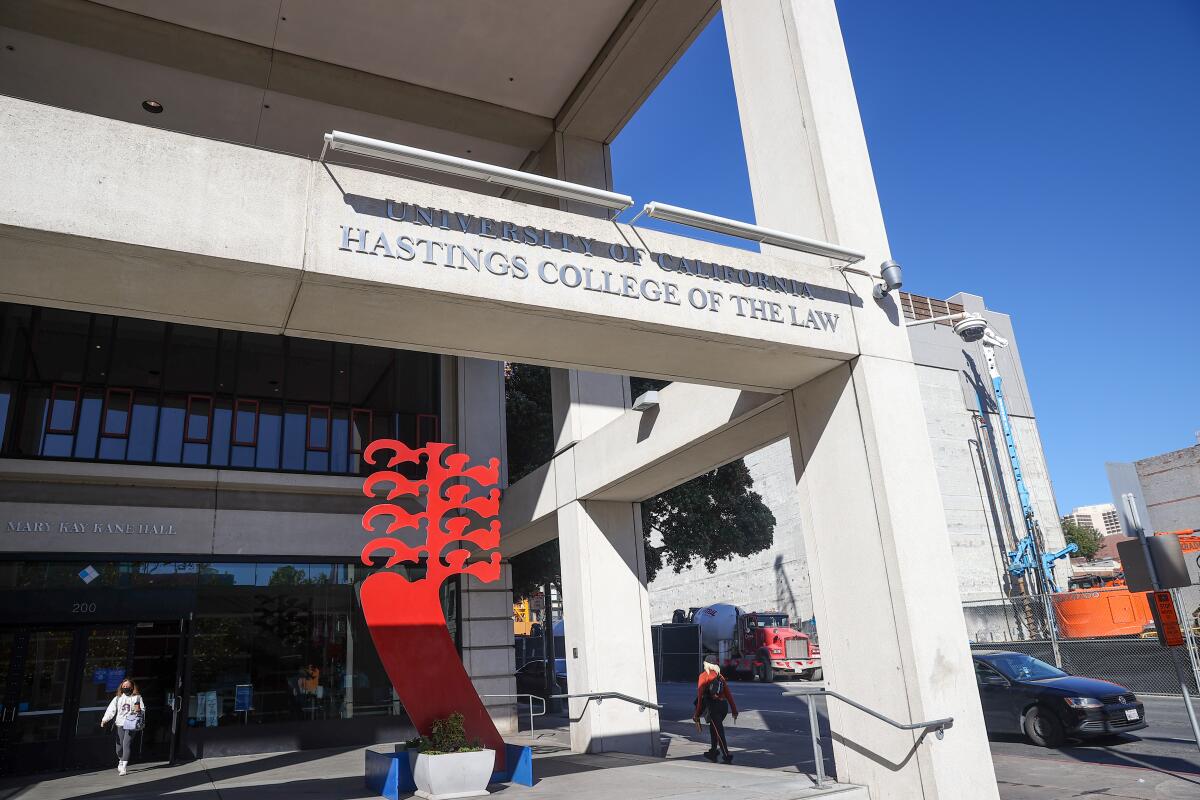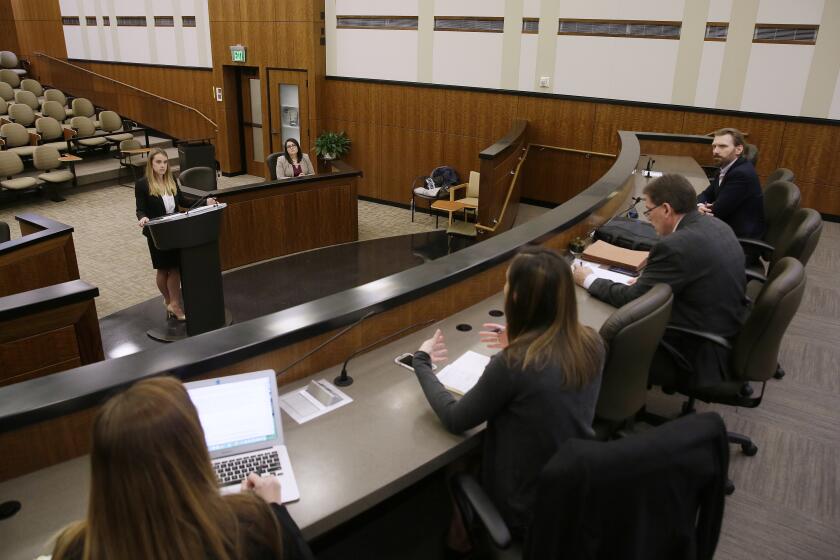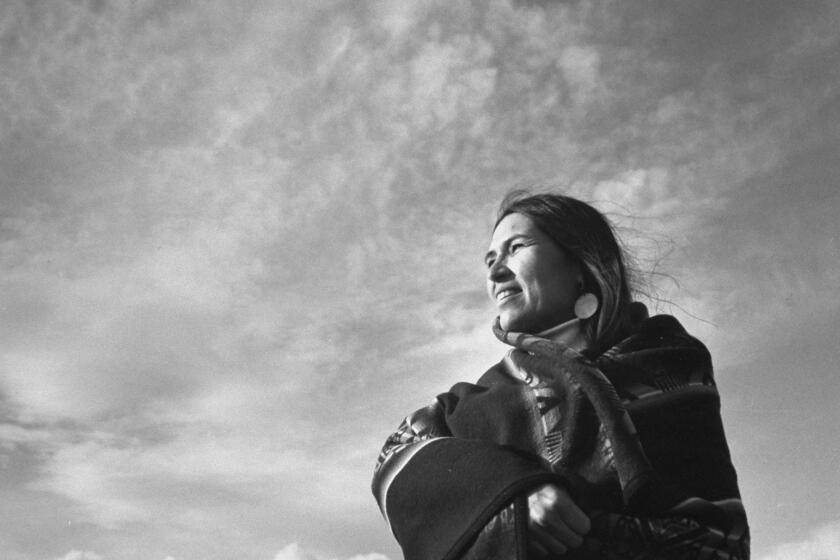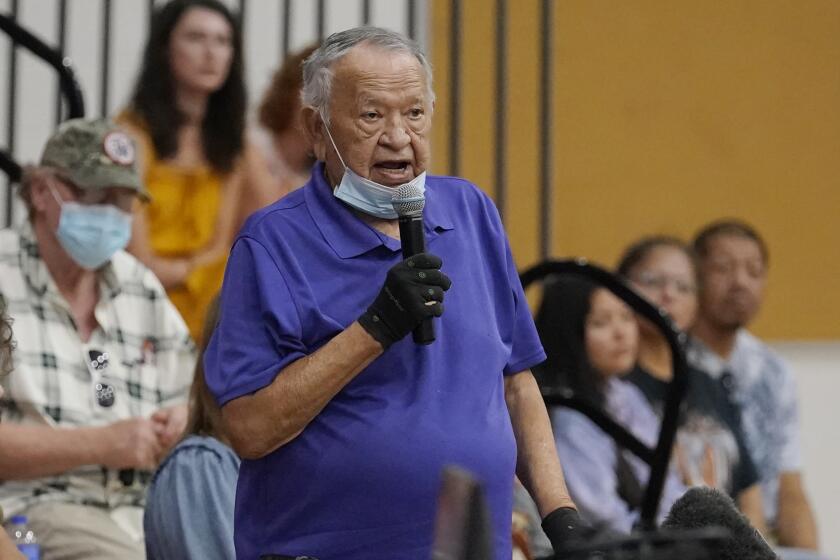Descendants of UC Hastings College of the Law founder sue California to block school name change

Descendants of UC Hastings College of the Lawâs founder sued California on Tuesday to block a scheduled name change that was signed into law by Gov. Gavin Newsom last month.
The stateâs first law school was founded by Serranus Clinton Hastings in 1878 after he served as the first chief justice on the California Supreme Court. But in 2020, a commission report explained how after Hastings arrived in California during the Gold Rush, he paid for and promoted expeditions in the Eden and Round Valleys of Northern California that resulted in the deaths and displacement of hundreds of Yuki Indians, whose land he later took for himself.
Hastings donated $100,000 in gold coins to the state to establish the law school in San Francisco and required that the college bear his name in perpetuity and that one of his relatives sit on the board of directors. Though the law schoolâs board of directors voted to change its name in 2021, it was bound by law to the conditions set during the schoolâs establishment. Circumventing those contractual obligations would require legislative action, according to lawmakers.
On Sept. 23, Newsom signed into law Assembly Bill 1936, which allowed California to sever its ties from Hastingsâ legacy and allowed the school to change its name to UC College of the Law, San Francisco. The bill was co-sponsored by Assemblymembers Phil Ting (D-San Francisco) and James Ramos (D-Highland), who is the first Native American elected to the state Assembly.
Thereâs no disputing the role of the namesake of UC Hastings in an American genocide. His name doesnât belong on UCâs law school.
âAB 1936 ensures that the history and suffering of the Yuki and Round Valley people are not dismissed,â Ramos said in a statement. âThis is a critical step toward healing a traumatic history and rectifying wrongs.â
But on Tuesday, Hastingsâ descendants sued the state, the law school and its board of directors in San Francisco County Superior Court, claiming that the state is obligated to honor its contract with Hastings and that the stateâs action âheaps scorn and punishment upon S.C. Hastings, his descendants, and indeed, by association, upon all of the tens of thousands of Hastings law graduates living and deceased.â
The lawsuit was filed by the alumni under the name of the Hastings College Conservation Committee. They were joined by Stephen Hastings Breeze and several other relatives. They are represented by the Dhillon Law Group and the Berkeley-based law firm Michael Yamamoto.
The family disputes Serranus Hastings was responsible or involved in atrocities against Native Americans by financially supporting raids from state-run militia groups that sought to drive away tribes.
In at least one place with the offending name â the unincorporated town of Squaw Valley near Kings Canyon National Park â discussions about what the name should be have already grown heated.
âWhile AB 1936 convicts Serranus Hastings of killing Native Americans in the court of public opinion, this is false,â Scott Hastings Breeze said in a statement.
In their complaint, the descendants argue that critics attacked Serranus Hastings in a New York Times story in October 2017, written by journalist Thomas Fuller.
The complaint said the story âwrongly, maliciously, and baselessly claimed that S.C. Hastings âmastermindedâ the killings of hundreds of Native Americans, including the Yuki people.â
Hastingsâ descendants argue they did not have an opportunity to respond to the allegations made in the story when the schoolâs board of directors called an emergency meeting to address changing its name, according to the complaint.
The group asked the court to enforce the clause in the original legislative action that requires the state to pay back $100,000 to Hastingsâ descendants if the college âcease to exist,â along with 144 yearsâ worth of interest. That would equal more than $1.7 billion with an annual interest rate of 7%, according to the original terms of the agreement.
The Native American activist, who famously declined Marlon Brandoâs 1973 lead actor Oscar, died Sunday
In a statement, UC Hastings College of the Law said it was aware of the lawsuit filed in court.
âWe are disappointed that these plaintiffs are attempting to prevent the collegeâs name change, which was made official through Assembly Bill 1936 without any no votes in the state Assembly and Senate and signed by the Governor,â the law school said. âThe billâs passage was the result of a lengthy, deliberate and transparent process at the college that included years of thoughtful research, several public hearings and input from a wide range of community stakeholders. The college remains committed to moving forward with the name change, and to continuing our restorative justice efforts with the support of the campus community.â
The Round Valley Indian Tribes Yuki Committee, which was created to work with the school on a name change in 2020, wanted to use a Yuki name in place of the final name.
âEvery governing body has the right to change law. We were not happy with all of the processes and the chosen name, but we did not want the Hastings name to remain,â Nikcole Whipple, secretary of the Round Valley Indian Tribes Yuki Committee, said in a statement.
Whipple said the committee was aware of the opposition to the name change by some and asked its legal counsel, state officials and the bill authors whether it was appropriate to move forward. The committee was told that it was a state matter and that the state was following the correct process, Whipple said.
Under AB 1936, the school will also label a law library with an Indigenous name and acknowledge its founderâs history at both convocation and commencement events. Along with its restorative justice efforts, the law school will also offer free legal services to California Native tribes and install permanent memorial spaces on the college campus.
Itâs unclear whether the lawsuit will delay the name change that is set to take effect Jan. 1.
The college counts Vice President Kamala Harris and U.S. Rep. Jackie Speier (D-Hillsborough) among its notable alumni.
Native American tribal elders in Oklahoma delivered powerful testimony about their experiences in government-backed Indian boarding schools.
More to Read
Sign up for Essential California
The most important California stories and recommendations in your inbox every morning.
You may occasionally receive promotional content from the Los Angeles Times.














